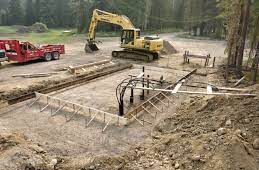In the realm of construction, the foundation is the bedrock upon which the entire structure rests. Among the various foundation types, the monolithic slab stands out as a stalwart choice, offering stability, durability, and efficiency. In this article, we delve into the characteristics, advantages, and applications of monolithic slabs, exploring why they are considered a solid foundation for construction excellence.
Characteristics of Monolithic Slabs:
A monolithic slab is a single, continuous layer of concrete that serves both as the foundation and the floor of a building. This type of foundation is cast in a single pour, eliminating the need for separate foundation and floor components. Typically, it is reinforced with steel to enhance its structural integrity, making it capable of withstanding the pressures of the building it supports.
One notable feature of monolithic slabs is their seamless nature. The absence of joints and connections reduces the risk of water infiltration and soil erosion, contributing to the longevity of the structure. Additionally, monolithic slabs often characterized by a level surface, making them an ideal choice for structures that require a smooth and even foundation.
Advantages of Monolithic Slabs:
- Cost-Efficiency: Monolithic slabs offer cost advantages due to their simplified construction process. The single-pour method reduces labor and material costs associated with installing separate foundation and flooring components.
- Time Savings: The efficiency of the monolithic slab construction process translates into time savings. Since the foundation and floor are created simultaneously, construction timelines are significantly shortened compared to traditional methods.
- Durability: The integration of steel reinforcement enhances the durability of monolithic slabs, making them resilient to soil movement and settlement. This durability contributes to the longevity of the entire structure.
- Energy Efficiency: Monolithic slabs provide thermal mass, helping to regulate indoor temperatures. This inherent energy efficiency can lead to reduced heating and cooling costs over the lifetime of the building.
Applications of Monolithic Slabs:
- Residential Construction: Monolithic slabs commonly use in residential construction, particularly for single-family homes. Their cost-effectiveness and quick construction make them an attractive option for homeowners and builders alike.
- Commercial Buildings: The efficiency and durability of monolithic slabs also make them suitable for various commercial applications. Warehouses, retail stores, and small to medium-sized businesses benefit from the quick turnaround time and solid foundation provided by monolithic slabs.
- Industrial Structures: In industrial settings, where heavy machinery and equipment are commonplace, monolithic slabs offer the necessary strength and stability. Their seamless construction minimizes the risk of damage from equipment vibrations.
Conclusion:
The monolithic slab, with its seamless construction, cost-efficiency, and durability, stands as a testament to the evolution of foundation technology in construction. Whether used in residential, commercial, or industrial settings. The advantages of monolithic slabs contribute to their reputation as a solid foundation for construction excellence. As the construction industry continues to evolve. The monolithic slab remains a reliable and innovative choice for builders and architects seeking a strong and efficient foundation.

